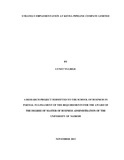Strategy implementation at Kenya Pipeline Company Limited
Abstract
Strategy implementation evolves either from a process of winning group commitment
through a coalitional form of decision-making, or as a result of complete coalitional
involvement of implementation through a strong corporate culture. Strikingly,
organizations fail to implement about 70 per cent of their new strategies. The objective of
the study was to determine factors affecting strategy implementation in at Kenya Pipeline
Company Limited, and the challenges affecting strategy implementation at Kenya
Pipeline Company Limited.
This was a case study since the unit of analysis was one organization. The researcher
used both primary and secondary data. Primary data was collected using an interview
guide. The staff in the company included all managers’ top, middle and low management
level, working at Kenya Pipeline Company Limited. Content analysis was employed to
analyze the data. The study found that successful strategy implementation helped a
company gain a competitive edge, define the business of the organization, achieve right
direction and having its various strategies entrenched and broadly accepted by all the
employees guaranteeing successful implementation in the future. Those involved in
strategy implementation process in the organization are senior managers, middle level
managers, top management and all employees.
The study concludes that successful strategy implementation helped a company gain a
competitive edge, define the business of the organization and achieve the right direction.
The study concludes that the organization followed five steps in strategy implementation.
SWOT; analyze the gap between internal (S&W's) and eternal (O&T's) environment.
Initiatives taken by management in creating and sustaining a climate within the firm that
motivates employees in their implementation role were the organization and their
managers paying as much attention to planning the implementation of their strategies as
they give to formulating them. A top-down/laissez-faire senior management style was
used. The study recommends that the management should ensure they employ and deploy
qualified and competent individuals. Also, the study recommends that Kenya Pipeline
Company Limited should employ monitoring/supervision mechanism, also allocate
enough funds to allow project completion. The study also recommends that Kenya
Pipeline Company Limited should embark on staff improvement through training.
Citation
Master Of Business Administration (mba), School Of Business, University Of Nairobi, 2013Publisher
University of Nairobi, School of business,

